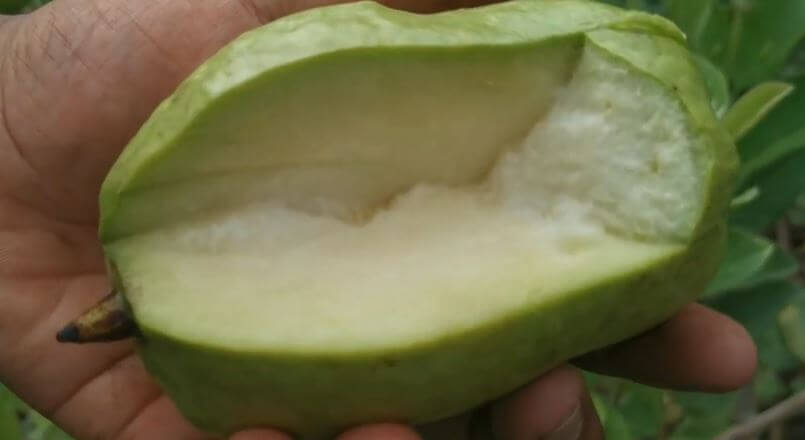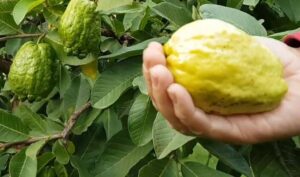In this article, we are going to be looking at one of the special varieties of guava that is guava without seeds or seedless guava.
Overview
Seedless guavas are fruits of guava that grow on a small and evergreen shrub that is not more than 3-10 meters in height.
The trunk of seedless guava has bark that is smooth and flaky. The bark is usually grey-brown to green in color.
The tree is also wide-spreading just like any other guava with evergreen leaves. The leaves are simple and oppositely arranged with the entire leaf margin.
The flowers possesses white to pink petals and green outer sepals. The stamens are numerous.
The fruits of seedless guava are usually round. However, the fruit can also be piriform or ovoid. The outer skin is thin and greenish that is completely edible.
Seedless guava fruit is large and the size can range from 5 to 10 cm in diameter. The fruits of guava without seeds are usually more delicious than the seeded guava varieties.
The pulp is very fleshy and without seeds or with few seeds. The pulp also releases a fine and strongly fragrant aroma that smells like flavors of passion fruit, peach, and lime.
This variety of guava is seedless because of its low fertility. And this variety is usually bred ana grown for its commercial usage. The variety is a very low producer of fruits when compared with other varieties of guava.
Guava without seeds is mostly found in Thailand, Indonesia, and India. But, it can now also be found in Malaysia and it is well adapted to the region. Presently, seedless guava is almost grown everywhere around Asian countries.
Nutrients Content of Seedless Guava

Seedless guava is of two forms: the white and pink seedless guava. The pink seedless guava has flesh that is pink while the white one possesses flesh that is white.
Both the pink-fleshed and white-fleshed seedless guavas are a reservoir of vitamins, minerals, and phenolic compounds.
Learn more about the nutritional value of guava in our guide to nutritional facts of guava
Just like any guava variety, the calories in guava without seeds contains 68 calories.
Economic Importance
Guava without seeds can be used for ornamental purposes to beautify the surroundings. The aroma from its flowers and fruits is very pleasant and is used to complement bad odor from the environment.
The greenish foliage also helps cut down the amount of co2 and CO in the surroundings, which in turn prevents greenhouse effects.
The leaves and bark are great sources of medicines that are widely used in the treatment of various diseases.
The fruit is a favorite ingredient in many recipes such as salad dressings, jams, jellies, desserts, and smoothies.
How to Eat Guava Without Seeds

Guava without seeds can be eaten fresh or cooked. In Thailand and Taiwan, seedless guava is usually harvested when about to be fully ripe. This under-ripe guava is sliced and dip into plum powder and enjoy as a condiment.
The juicy and riches fleshy pulp can also be processed into juices and beverages. The seedless guava is also a popular ingredient in salad dressings.
The rich crispy flesh can be shredded and mix with lettuce, then dress the combo in lime juice, fish source, sugar, lime, dried shrimp, coriander, onion, and mint.
The fully ripe guava without seeds is an ideal ingredient for making jams, jellies, cake, bread, and smoothies.
Conclusion
We hope that this article was of excellent help for you in understanding facts about seedless guava. We like to hear more of your questions and views. So, do write to us in the comment section below.
Recommended reading:
>23 Health Benefits Of Guava Backed By Study
>Minerals And Vitamins In Guava Fruits And Leaves
>List Of Antioxidants In Guava Leaves And Fruits
>Guava Diseases: Distribution, Symptoms, And Management
>Guava Pests: Symptoms And Management
References
Akanda, Md. Khokon & Mehjabin, Sanzia & Uzzaman, Shakib & Parvez, Masud. (2018). A short review on a Nutritional Fruit : Guava. Toxicology Research. 1. 1-8. https://www.researchgate.net/publication/330702066_A_short_review_on_a_Nutritional_Fruit_Guava
“Flowering, Fruiting Behavior and Nutritional Quality of Selected Guava Genotypes” retrieved from https://www.researchgate.net/profile/Santosh_Bose/publication/333866854_Flowering_Fruiting_Behavior_and_Nutritional_Quality_of_Selected_Guava_Genotypes/links/5d09daad299bf1f539cf0bf0/Flowering-Fruiting-Behavior-and-Nutritional-Quality-of-Selected-Guava-Genotypes.pdf




